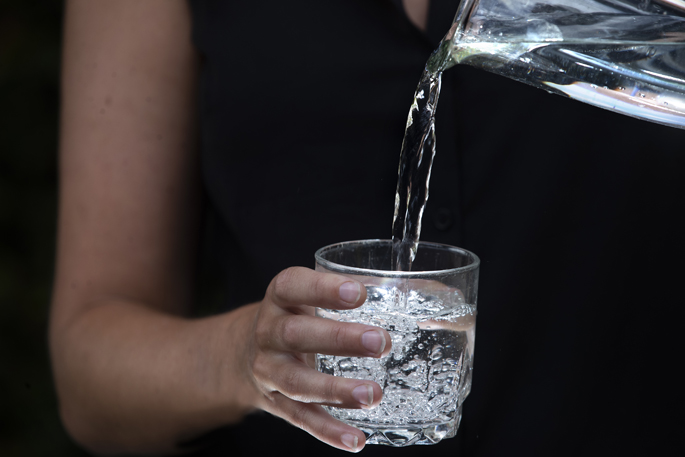Tauranga and the Western Bay of Plenty have been directed to fluoridate their water supplies but one council has serious concerns about it.
Yesterday, director-general of health Dr Ashley Bloomfield announced 14 local authorities would be directed to add fluoride to some or all of their water supplies.
It is the first time this power has been used since the legislation was amended last year to ensure a 'national approach” to fluoridating water.
This included Tauranga City Council and the Western Bay of Plenty District Council.
Dr Bloomfield instructed the city council to fluoridate all three of its water supplies and the district council must fluoridate two of its eight supplies.
The district council supplies are for Athenree and Wharawhara that covers Waihī Beach, Athenree, Tanners Point, Katikati and the reticulated rural area through to Morton Road.
Western Bay of Plenty District Council has serious concerns with the directive.
Mayor Garry Webber says before council went any further there are several important questions that need to be addressed.
'Yes, it's an instruction from the Ministry of Health but there needs to be clear direction on the funding of capital and ongoing operating costs,” he says.
'We will be working hard to ensure there is no financial burden passed on to the community.”
He also questions why it is just two water supplies and the ongoing implications.
'Is this the beginning of fluoride being added to the entire district's water supply?”
 Western Bay of Plenty Mayor Garry Webber had questions about funding the fluoridation. Photo: John Borren/SunLive.
Western Bay of Plenty Mayor Garry Webber had questions about funding the fluoridation. Photo: John Borren/SunLive.
The government offered a financial incentive by inviting council's to apply for a slice of the $11.3 million fund for capital projects associated with fluoridation.
Tauranga City Council chief executive Marty Grenfell says it is unclear what portion of the estimated $3.6m capital set up cost would be covered by the grant or how the expected operating costs of $175,000 a year would be funded.
Both Webber and Grenfell say the councils are obliged to follow the directive. Webber adds if council did not comply it constituted an offence under the Health Act.
The water must be fluoridated at optimal levels, between 0.7 parts per million to 1 part per million. Tauranga city must comply by July 31 2024 and the Western Bay of Plenty by July 31 2025.
In 1992 Tauranga removed fluoride from its water supply after a referendum, where 51 per cent of people voted to stop adding it.
Bay of Plenty MP Todd Muller says the case for fluoridation is 'pretty compelling” and he supports the two councils acting on the directive.
'I support council engagement with the government to ensure it's rolled out across our potable water infrastructure cost efficiently,” says Muller.
New Zealand Dental Association Bay of Plenty spokesperson Rob Aitken says Dr Bloomfield needed to be congratulated for his direct stance on fluoridation.
'There's a huge need in New Zealand ... and something has to be done on a nationwide basis,” says Aitken.
'Fluoridation is extremely beneficial to oral health. Is it the answer complete answer? No, of course not.”
He says home care and twice daily brushing with a fluoride toothpaste are part of good oral health outcomes.
In his extensive career, including 12 years as the clinical director of community oral health at the Waikato District Health Board, Aitken has seen a decline in people's oral health.
'New Zealand's oral health status has decreased in the last 20 years. It's significant amongst our child and adolescent population.”
He says a lot of it is dietary and due to sugary drinks, but fluoride still plays an important role.
Aitken explains that fluoride makes teeth 'less susceptible to acid attack” and the acid is caused by bacteria in the mouth turning sugar into acid.
'If you add fluoride to the drinking water or if you use fluorinated toothpaste, the enamel of your teeth is more resistant to acid attack and that's as simple as it is.”
He estimates if fluoridation was rolled out nationwide then there would be a 20 to 40 per cent increase in people's oral health.
 Toi Te Ora Public Health medical officer of health Dr Jim Miller. Photo: Supplied.
Toi Te Ora Public Health medical officer of health Dr Jim Miller. Photo: Supplied.
Toi Te Ora Public Health medical officer of health Dr Jim Miller says it is estimated that drinking water fluoridation can reduce lifetime incidence of tooth decay by 40 per cent among children and adolescents and reduce tooth decay in adults.
'Poor oral health is a concern in the Bay of Plenty area,” says Miller.
'In 2020, the Community Oral Health Service reported that only half of children aged 5 who they examined had no tooth decay.”
He says Toi Te Ora 'strongly supports” water fluoridation to protect and improve people's oral health, particularly children and population groups most at risk of dental decay.
Addressing people's concerns around water fluoridation, Miller says fluoride is naturally present in drinking water, but in most New Zealand water sources this is below the level that benefited teeth.
'Water fluoridation is when the natural fluoride level in the water supply is topped up with just enough fluoride to protect our teeth.”
Aitken says he respected the opinions of those opposed to fluoridation but 'science simply says that they're wrong”.
'The overwhelming evidence is that water fluoridation at 0.7 parts per million is not injurious to general health.”
 Director-general of health Dr Ashley Bloomfield. Photo: RNZ.
Director-general of health Dr Ashley Bloomfield. Photo: RNZ.
Dr Bloomfield says fluoridation is proven to be a 'safe, affordable and effective” method of preventing tooth decay.
'Community water fluoridation benefits everyone, but especially children, Māori, Pasifika and our most vulnerable,” he says.
'Fluoridated water is safe for everyone to drink – including babies and the elderly – and fluoride exists naturally in air, soil, fresh water, sea water, plants and in food.”
He pointed to the 2009 New Zealand oral health survey that shows that children and adolescents living in areas with fluoridated water have a 40 per cent lower lifetime incidence of tooth decay than those living in areas without.
Dr Bloomfield says it is likely he would 'actively consider” whether to issue further directions to fluoridate later this year.
Public Interest Journalism funded through NZ On Air.



11 comments
Fluoridation mandate
Posted on 28-07-2022 18:42 | By tia
This political response is the reason why fluoridation was removed from the politicians and passed to the Ministry of Health. The sooner politicians realize this and take their blinkers off the better for all.
What
Posted on 28-07-2022 20:08 | By Informed
We don’t have fluoride in our water. God this place is backwards. Fix it!
Fluoride
Posted on 29-07-2022 02:44 | By Johnney
Great for the teeth but no bans or taxes on the real culprit SUGAR.
Start drinking...
Posted on 29-07-2022 06:41 | By fair game
to get any benefit from fluoridated water, one needs to consume about 3L per day! Back in the day we were given fluoride tablets which were free and much more effective. Maybe NZ should consider this? A lot cheaper!!!
Crazy
Posted on 29-07-2022 07:29 | By Angels
We do not need nor want. They will boost water filter systems in the country Hope we have lots. Fluoride is not as good as they say. Get people to brush their teeth instead
Science
Posted on 29-07-2022 08:07 | By Hugh Janis
Science has been wrong a fair bit lately.
I think not
Posted on 29-07-2022 08:58 | By RML
Sunlive. Here is my softer version. Quote: Dr Bloomfield says fluoridation was proven to be a “safe, affordable and effective” method of preventing tooth decay. I think not. Out of a cubic meter that you receive at your houses water meter, the household only drink 4 liters max. That water also goes straight past your teeth into your stomach. The rest of the 99.9% of fluoridated water goes ,to the shower, bath, washing machine, sink, down the toilet and to the garden tap so you can water your lawn and also to wash your car in fluoridation.Toothpaste is the answer if you want fluoridation. Please stand up NEW ZEALAND.
3 waters timing
Posted on 29-07-2022 13:14 | By CliftonGuy
What is it going to cost councils to instal the flouridationequipment? I wonder if the government is deliberately requiring councils to incur this cost, just prior to the annexation of this very equipment under the 3 Waters regime? Will this cost be reimbursed? I have my doubts. Just another burden on ratepayers. PS - I have nothing against flouridation itself.
mass medication???
Posted on 29-07-2022 13:17 | By uli
They say our fluoride level in our water is too low but I have never seen a statistic of fluoride levels here and overseas where they have "normal" fluoride levels. Further I would like to see a comparison of tooth health between here and cities which have fluoridation. Certain is that some companies make profits from fluoridation. Known side effects are problems when you have arthritis and osteoporosis. Instead of taxing sugary drinks they think the silver bullet is fluoridation! Don't hurt the big companies hurt the older people instead.
Double Standard
Posted on 29-07-2022 15:39 | By ShortyH
Western Bay Mayor Webber says “We will be working hard to ensure there is no financial burden passed on to the community.” Really? He did nothing to try to stop the Government from stealing our Three Waters assets valued at $330 million. WBOPDC gets income of about $26 million a year from water rates so they will lose that as well. That is going to be a REAL financial burden.
@Johnney
Posted on 29-07-2022 18:23 | By morepork
You put your finger right on it. Adding fluoride to water is like trying to lower the river instead of raising the bridge. I am satisfied about the scientific evidence for flouride being safe, and, if you have ever seen pictures of the damage done to kids' teeth in areas without fluoridation, you will be unlikely to oppose it. I still don't think it should be ENFORCED WITHOUT a referendum. The last one was narrow; maybe it's time for another. This also encourages the Government to make sure that ALL the evidence is available, so people can make an informed choice. The real culprit is the inclusion of sugar in almost all processed products and we should be looking at tax on that and an information campaign to make people more aware.
Leave a Comment
You must be logged in to make a comment.